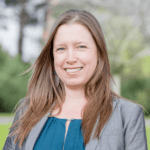This summer, Ten Strands partnered with Sequoia Riverlands Trust and the Tulare County Office of Education to offer the first-ever SEED Summer Institute. The Sequoia Environmental Education Directive (SEED) was established in 2014 as a coalition of environmental education organizations dedicated to working together to expand access to outdoor learning in the Southern San Joaquin Valley. In 2023, Sequoia Riverlands Trust (SRT) received a NOAA B-WET grant to enhance K–12 educators’ capacity to address climate literacy in Tulare County. Starting in the spring of 2024, Ten Strands and SRT welcomed new members and leaders to help SEED launch new projects. Thanks to this powerful collaboration, SEED is emerging as a pivotal initiative, bringing together educators and community leaders to advance climate literacy and outdoor education in Tulare County.
Growing the SEED Network
Leading up to the Summer Institute, former Ten Strands director of client engagement services and research, Dr. Amy Frame, and Julie Ira, partnerships and technical assistance climate corps fellow, worked with SRT’s education staff to reach out to early SEED members and enlist their help in expanding participation and identifying new leaders.
To include even more voices, SEED conducted a broad survey of teachers, students, and community-based partners in Tulare County about environmental education and climate literacy. One thing stood out: folks in every group were much more familiar with climate change causes and impacts than they were with any kind of solutions. This finding helped the planning team focus on highlighting positive things already being done. SEED hosted virtual meetings to introduce members to one another and to showcase some of these bright spots from various sectors: K–12 education, districts, the county office of education, higher education, businesses, and agencies.
In late spring, SEED held its first in-person strategic planning meeting to discuss the coalition’s future, including its mission, vision, membership, and goals. There was representation from a surprisingly broad cross-section of local organizations, including the Native Star Foundation, UC Merced, Porterville College, Sequoia Parks Conservancy, School of Science and Conservation (SCICON), and many others. The meeting helped to overcome some of the isolation felt by folks in rural Tulare County. One participant said the meeting was “impactful, exciting and uplifting. It was amazing to be in a room of like-minded folks working toward a common goal.”
Co-Hosting Our Summer Institute
The Summer Institute was designed to connect classroom learning with real-world applications through outdoor education in and around Tulare County, focusing on several key objectives.
One of the main objectives was to create a comprehensive climate literacy framework grounded in the Tulare County Climate Action Plan, NOAA’s Essential Principles of Climate Literacy, California’s Next Generation Science Standards (NGSS), and the requirements of AB 285 (2023), which mandates climate change education in science courses for grades 1–12. During the institute, educators spent time understanding and analyzing California’s Environmental Principles and Concepts as well as Climate Literacy Concepts in the Next Generation Science Standards. They identified applicable principles and standards for their grade levels and worked together to develop lessons that align with state standards.

To ensure the lessons were firmly rooted in the local ecology and economy, day two of the Summer Institute was dedicated to an immersive field trip exploring the Kaweah River Watershed. Participants visited three significant sites to gain a deeper understanding of the region’s environmental dynamics. The tour began at the Kaweah Oaks Preserve, where Bud Darwin from SRT and Wuksachi Tribe members Johnny Sartuche and Jennifer Malone provided insights into the preserve’s ecology and cultural significance. The group then proceeded to Terminus Dam, where Mark Larsen from the Great Kaweah Groundwater Sustainability Agency explained the water management systems and structures relevant to the area. The day concluded with a presentation by Amanda Wilson at the Sequoia National Park Foothills Ranger Station, where they discussed the impacts of climate change on giant sequoias and the strategies for fire management. This hands-on experience enhanced participants’ understanding of local environmental challenges and exposed them to outdoor learning field trip sites for their students.

Following the field trip excursions, participants created ecosystem climate change models representative of the geographic areas in Tulare County, including the mountains and forests, foothills and cropland, and the valley floor. This modeling activity was instrumental in helping teachers think about framing lessons that consider the causes and impacts of climate change apparent in the students’ surroundings, making lesson content more pertinent and relatable. The models included data from local climate action plans, which showed that dairy and feedlots are the largest greenhouse gas emitters and that the growth of urban areas is the biggest focus of local planners in the near future. Countering a cultural norm of avoiding these topics, teachers expressed relief at naming some of the challenges in balancing the goals of businesses, conservation organizations, and families in supporting themselves in this ag-based region. This asset-mapping activity helped folks add to this SEED Field Trip Sites Map Padlet, including dairy methane digesters and regenerative farms, which are sites of climate change mitigation and adaptation innovations.


Participants from Tulare County’s Kaweah and Tule River watersheds modeled climate change causes, impacts, and strategies for mitigation and adaptation.
During the institute, educators discussed eco-anxiety and crafted their own climate emotions wheel. Participants shared the emotions they included, using the space to discuss their experiences with climate anxiety and the isolation that often arises from not discussing climate change in communities. Folks expressed lots of fear and isolation. This exercise proved highly beneficial for the participants, as it built solidarity and support amongst the group. This communal acknowledgment not only reinforced the commitment to expanding climate literacy throughout Tulare County, but it also empowered participants to continue these important conversations within their classrooms and beyond.
Lesson Design Institute
During the last two days of the week, SEED hosted the Lesson Design Institute in partnership with California Educators Together (CET). During this time, participants applied what they had learned throughout the week to create high-quality climate literacy lessons tailored to their chosen grade levels. Educators also learned how to navigate the CET platform, where they uploaded their lesson plans to contribute to a climate literacy lesson bank. This initiative facilitated the creation of resources and focused on localizing available resources, ensuring that the lessons were relevant and impactful for the Tulare County community.

SEED’s Next Steps
As a result of equipping educators with the knowledge, tools, and support to advance climate literacy in Tulare County, the Summer Institute fostered meaningful connections among participants. One educator expressed this sentiment, saying, “I appreciated the connections I made with various community members and all the teachers who were like-minded about climate change.” The collaborative spirit established and sustained by participants throughout the week was a defining outcome of the institute, demonstrating the value of building a supportive network dedicated to addressing climate change.
Another participant remarked on the newfound awareness gained during the institute: “I did not know about the climate mitigation plans and regulations in place at any of the levels we experienced. I appreciated the travel destinations and learned new things about each.”
Looking ahead, SEED is committed to building on this momentum. As SEED moves forward with plans for additional workshops and watershed meetups, the positive impact of these connections and the deepened understanding will continue to drive the coalition’s efforts to advance climate literacy throughout Tulare County.
Article written by: Dr. Amy Frame and Julie Ira.


